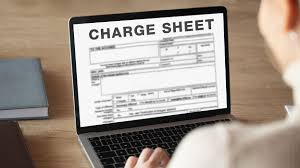What Happens When An Fir Is Registered?
FIR is registered on commission of an offence at the instance of victim or state (Police Officer). FIR is registered under Section 154 of Cr.P.C. and it is first information of reporting an offence orally or written.
Once, FIR is registered, the Investigating Officer of the police investigates the matter and collects/record the evidence that may prove the commission of an offence by the Accused. The Investigating Officer may or may not arrest the Accused. The Investigating Officer, however, calls upon/serve notice to the Accused Persons for participating in the investigation. The investigating officer, after completion of investigation, file a final report before the Magistrate which is also called charge sheet under Section 173 Cr.P.C. The charge sheet is also called “Challan” “Police Report”.
The charge sheet filed by the investigating officer under Section 173 Cr.P.C. states “Brief Facts of the Case” alongwith details of accused persons, details of suspect person not charge sheeted (Column 12 of the charge sheet), particulars of witnesses to be examined by the prosecution (state) during the trial, copy of FIR, statement of witnesses before police (statement under Section 161 Cr.P.C.), statement of witness before Magistrate (statement under Section 164 Cr.P.C.), medical certificate (MLC), site plan (place of commission of crime), arrest memo, police bond etc. Charge sheet may be filed by investigating officer without arrest of the Accused and in that case, the Accused is granted bail by the court on the ground that charge sheet has been filed by investigating officer without arrest of the Accused.
On receiving of a charge sheet in an FIR, the court upon satisfying itself, takes cognizance of the offence stated in the charge sheet and summon the accused persons. As and when, the accused persons appear, they have to prefer an application for grant of bail before the court. The copy of charge sheet is supplied and the case is listed for framing of charges upon the Accused.
The charge sheet disclose all the facts alongwith evidence against the accused persons which prosecution wish to rely upon during the trial of the case. It is advisable to read the charge sheet carefully. Each and every word, date, witnesses mentioned in the charge sheet, section under which charges are proposed should be read minutely.
At the time of arguments on the charge, the advocate should satisfy the court that prima-facie, the proposed charges against the Accused are not made out after referring to the charge sheet. Upon hearing the Advocate for the Accused and the prosecution, the court frame charges upon the Accused and statement of the Accused is recorded, whether the Accused pleads guilty (confess crime/offence) or pleads not guilty (do not confess the offence and seek his right for trial in the case). Thereafter, the case is listed for prosecution evidences and their cross-examinations. It is advisable to find out from the court record as to which prosecution witness is summoned for next date so that the advocate can prepare accordingly in a well-planned manner.
The above information is to impart awareness and no part of this should be construed as providing legal advice for any purpose.
Vikram Kumar
Advocate


